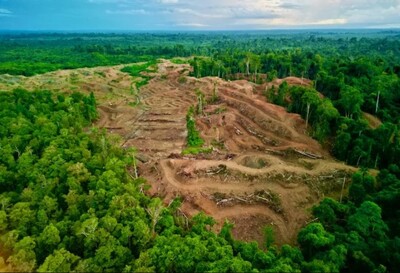Pusaka| 13 March 2024
Skewed policies in favor of forest-destroying tycoon

PUSAKA discovered that there are two oil palm plantation companies, namely PT Papua Agri Mandiri (PAM) and PT Sorong Global Lestari (SGL) in Sorong Regency, which are currently processing the requirements for Conformity of Space Utilization Activities (KPPR) which was previously referred to as Location Permit as a requirement for obtaining a Business License, which is regulated in Government Regulation Number 5 of 2021 and Government Regulation Number 21 of 2021. Based on a quick analysis and the facts in the field, it is acknowledged that PT PAM has acquired land from former oil palm plantation companies, namely PT Sorong Agro Sawitindo and PT Papua Lestari Abadi, covering an area of 26,914 hectares, while PT SGL acquired the land of PT Inti Kebun Lestari.
It is identified that the KPPR location directions issued by the government to two companies, PT PAM and PT SGL, are located in the Moi Sigin indigenous community area in Segun District, Malabotom District and the Moi Kelim in Klamono District, Sorong Regency, Southwest Papua Province.
Based on the information from the Directorate General of General Law Administration’s online data, it is acknowledged that the shareholders and management of PT PAM and PT SGL are related to the Fangiono family and the Ciliandry Arky Abadi (CAA) Group. The Fangiono family is one of the richest palm oil tycoons (taikun) in Indonesia. In Papua, CAA controlled and acquired the shares in three palm oil companies, namely (1) PT Inti Kebun Sejahtera with a Plantation Business License (IUP) covering an area of 38,300 hectares; (2) PT Inti Kebun Sawit with an IUP of 37,000 ha; and (3) PT Inti Kebun Lestari covering an area of 34,400 ha. The three companies are located in Sorong Regency.
In 2021, the Regent of Sorong revoked the plantation business permits of PT Inti Kebun Lestari, PT Sorong Agro Sawitindo and PT Papua Lestari Abadi. However, the companies challenged the regent’s decision up to the cassation level at the Supreme Court. The companies also continued their attempts to acquire and expand palm oil business land by changing their names, which is possible under the Job Creation Law policy and downstreaming programs.
The data figures shows Taikun Fangiono’s power and control over land and forest areas in the Moi Sigin and Moi Kelim indigenous regions covering a total area of more than 100,000 hectares, in which more than half of the concessions of the abovementioned five companies still have forest cover of around 67,000 hectares. It is also identified that the CAA group companies own tens of thousands of hectares of oil palm plantations in the Central Kalimantan, East Kalimantan and Riau Islands regions. The control and ownership of oil palm land on a large scale and concentrated in a handful of companies indicate economic inequality and is contrary to the provisions of Government Regulation Number 26 of 2021 regarding Implementation of the Agricultural Sector, namely Article 3 paragraphs (1) and (2), in that the maximum area limit for oil palm companies is 100,000 hectares for one Plantation Company nationally.
In several reports from civil society organizations, it is acknowledged that the Fangiono family businesses through the CAA group, Fangiono Agro Plantation (FAP Agri) and First Resources, have also destroyed forests, grabbed land and are in conflict with the communities and workers.[1] This is also the case with PT IKSJ and PT IKS in Sorong Regency.[2] The Moi community in Moi Sigin District reported about the deforestation activities by PT IKSJ and PT IKS which continued to this day. The Moi Sigin tribe’s sacred mountain called Magarabat is under the threat of clearing by the companies.
Pusaka believes that the regional and national governments should implement agrarian reform policies by evaluating large-scale land tenure and imposing sanctions of permit revocation on oil palm plantation companies in Papua which violated customary and state regulations and which damaged forests and the environment, as well as seeking to fairly resolve land and labor conflicts.
The government is urged to continue its policy of controlling the permits and refrain from granting new permits for oil palm plantation businesses which shift the functions of forest areas and land in indigenous areas, as it is unjust and may lead to worsened economic problems, impaired livelihoods and increased difficulties of the people in obtaining adequate food.
The government must immediately discontinue the biased policies which are only in favor of companies and capital owners. The government should consistently take effective measures and implement programs towards protecting the existence and rights of indigenous Papuan people, empowering organizations and economic ventures of the indigenous people.
Contact Person:
Natalia Yewen, Mobile No.: +62 813-1753-7503
Advocacy, Campaign and Communication Division Staff
Link to the Photos of Deforestation in Sorong, 2024 : https://drive.google.com/drive/folders/1yjJdQ1lO75188YUCAK4t-5hu3cD22wvx?usp=sharing
[1] See: https://www.forestpeoples.org/sites/default/files/documents/First%20Resources%20Draft%203.4.pdf; see also: https://thegeckoproject.org/articles/chasing-shadows/
[2] See Pusaka’s Year-End Note, 2023: https://pusaka.or.id/catatan-akhir-tahun-pusaka-2023-tetap-berlawan/













